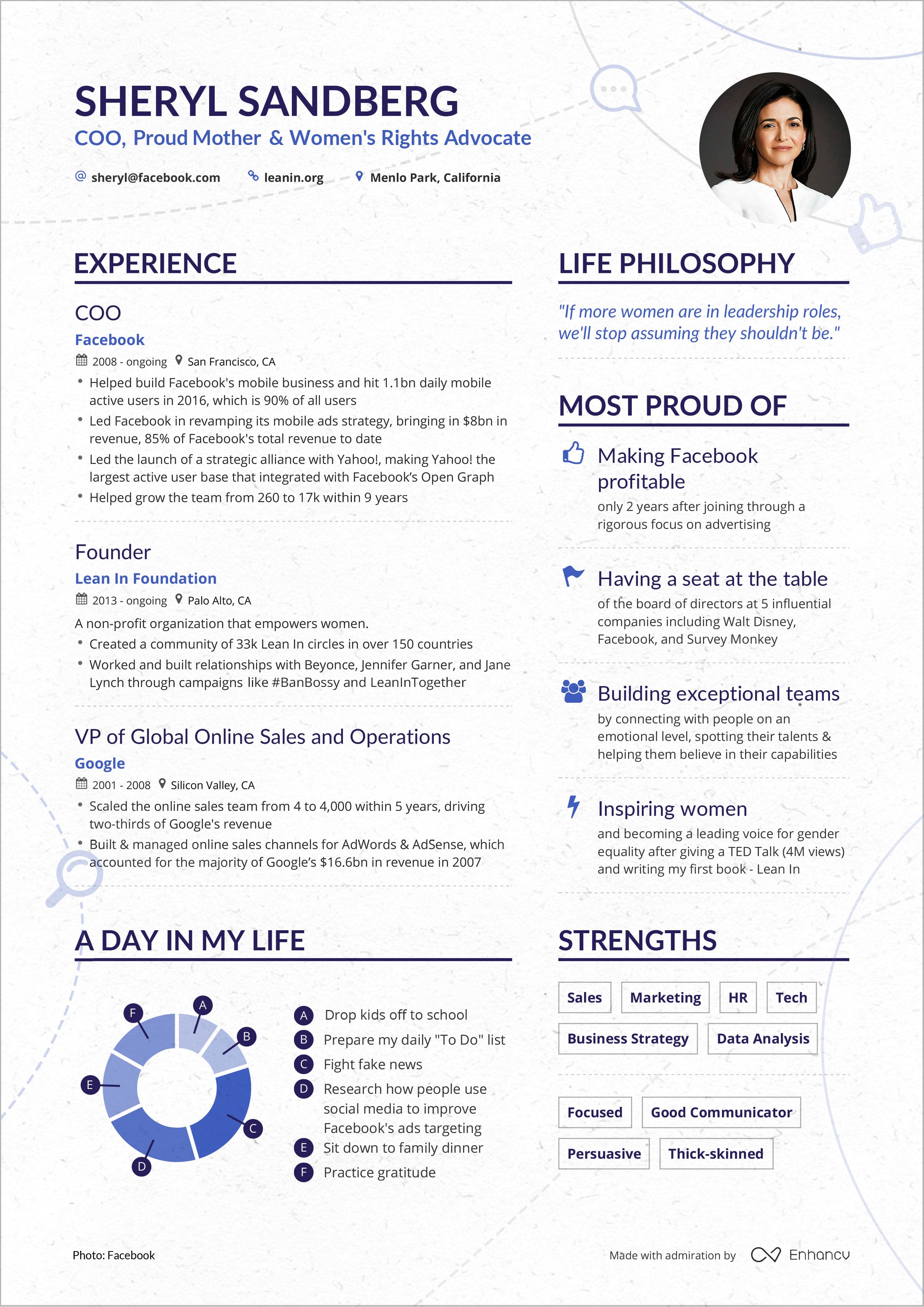A year working in the resume business has taught me that there is no single perfect resume format. Sure, I’ve come to believe that a personal resume is best, with personality and passions right up there with your work experience, but plenty of people disagree.
To learn more about just who thinks resumes should stick to the way they’ve always been and why, I created an experiment. The response was far more polarizing than I expected. People loved it and people hated it, not a single response was indifferent. But what was truly revealing was just who those lovers and haters were.
I found love and hate in a safe space
I’ve always derived inspiration from women in tech, especially after joining the field myself. Because of my admiration of her, I created a resume for Sheryl Sandberg. One which represented her not just as COO of Facebook, but as a loving mother, and women’s rights advocate. I tried to make it personal and professional, with a powerful message about who Sandberg is as a human being.
Note: It’s best to create your own resume. I only did this to get feedback that could improve our format as well as this article.
Here’s Sandberg’s resume for you to judge for yourself.

Now for the experiment: I posted the resume in 6 closed Facebook groups for women in tech which I’m a member of. These are the kind of groups where women share honest advice and inspiration with each other without worrying about outside trolls. Within minutes, I had set off a firestorm. The comments varied from the harshly critical:
“A resume should be a professional document. It is not a place for sharing your life philosophy or what you do in your free time. It should be filled with active verbs and keywords. And it should definitely not have any cutesy icons, background or a profile picture!” (Professional Career Coach & Resume Writer)
To the strikingly positive:
“I love this. I commend the person that decides to keep it real and be themselves on a resume. I’d rather have that person on my team than the boring old resume with the same buzzwords.” (CEO and Co-founder)
What was happening here? Some professionals adored this more personal resume style while others detested it. Again, not a single comment seemed in the middle.
On personal resumes: “i wish this was accepted”
Two arguments caught my eye. First, that “[my] resume writer wouldn’t approve this type of resume,” or similarly that “I wish this was accepted amongst recruiters.” I was reminded of previous jobs and situations where I felt it wasn’t my place to point out things that could be done better, things I believed in. To be more specific, women were unsure about putting things like “proud mother” on a resume, while I’ve seen men writing “proud father” without any hesitation. I wondered if this was connected to the confidence gap between men and women.
On the other side, there were women who were very excited that resumes are shifting from the traditional format to something that “reflects who you are as a person.” These women found it “visually appealing! I love how it incorporates more than just work experience and education.” They were eager to try this type of resume for themselves.
The main difference in opinion revolved around the personality revealing sections like “A day in my life” and “Life philosophy”. One group found them inspirational, they mentioned that this type of resume would help them choose the right candidate for their team. The other felt they were “childish and not professional,” arguing that employers don’t care about what you do in a day, they want to see your hard skills and achievements.
The difference between ceos and recruiters
As I investigated, I found the greatest predictor of whether someone would love or hate this type of resume: their position. On one side, there were career coaches, professional resume writers, and recruiters. On the other side, there were CEOs, business owners, and more junior women. The negative comments came from the first group, positive from the second. I wanted to understand the root cause.
Then it hit me: the first group is responsible for helping candidates land interviews and get hired. To allow them experimenting with an unusual resume format can seem scary because one mistake can put their reputation at risk. Their customers’ success rate is the one thing that helps them build a prosperous career.
The second group, CEOs and business owners, have nothing to lose. All they want is to hire the perfect fit for the company, someone who has similar values to theirs. If they interview the wrong person, the result doesn’t have such a huge impact on their reputation. That’s why they were excited to see a different type of resume, something that stands out and presents who you are as a person. They found it “short, sweet, and straight to the point.”
In the end, using a personal resume is all about the audience
As an aspiring writer, I always think of my audience before jumping into a new project. It feels so natural that I can’t imagine doing otherwise. The experiment I performed with Sandberg’s resume revealed that writing a resume is like writing anything else. It’s all about the audience. Everything you do should be for your audience.
For a resume, that means tailoring it for the person who will read it and the job you want. If you want to hire a professional resume writer or career consultant, no doubt they have plenty of expertise, but ultimately they aren’t your audience. So if a CEO said they loved it and a career coach said they hated it, I’d listen to the CEO because they’re my audience when I want to get hired.
In the end, I learned a lot about who loves and who hates personalized resumes. But I came back to my belief in the power of a resume with personality. Especially when you’re as cool as Sheryl Sandberg.
How do you feel about this kind of resume (and more importantly, why)?
*note, this article was originally published in November 2017
Make one that's truly you.



